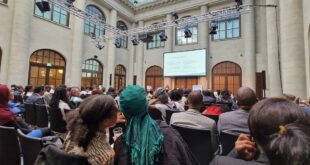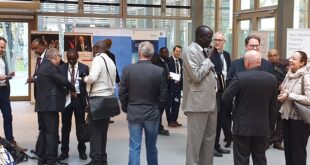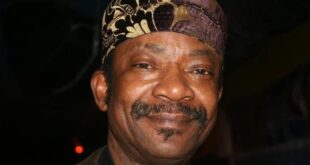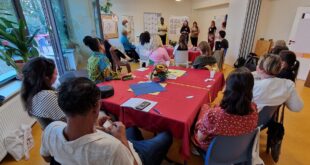Maisha – African Women in Germany e.V. has been honoured with yet another award for its efforts for the empowerment of African women in Germany.
Maisha, founded in 1996 by Virginia Wangare Greiner, was recently bestowed with the “Corporate Livewire West Germany Prestige Award 2020/21” for being the best “Self-Help Group of the Year”.
The organisation was honoured especially for one of its projects, Maisha Business Women in Europe (MBWE), which offers asylum-seeking women the opportunity to become financially independent by enabling them to access economic opportunities through their handicraft and service skills.
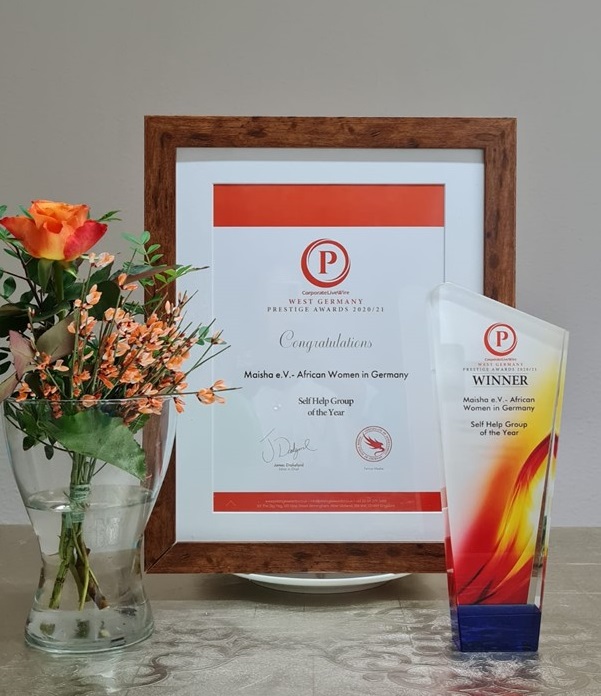
Launched in 2019, the project equips these women with the tools to develop their entrepreneurial skills and ideas, and market their products and services. The initiative also aims to create a sustainable economic bridge between asylum-seeking women in Germany and women returnees in Ghana by selling their goods on the MBWE online shop.
“MBWE gives the women the opportunity to apply the skills and knowledge they have acquired in their countries of origin and make a contribution to society here,” said Ms Greiner, who is originally from Kenya and has received numerous awards for her work for African women in Germany.
“And if they have to return home, they will take the skills and experiences they have acquired here with them to establish themselves in their home countries.”
One of the oldest African community initiatives in Germany, Maisha has been working on the improvement of the situation of African girls and women for twenty-five years.
In co-operation with the health department of the city of Frankfurt, the organisation has been offering health advice to Africans since 2004 at its Maisha Beratungsstelle (Maisha Advisory Centre) in the financial city. The centre also assists African families on other problems usually faced by immigrants, such as residence permit troubles and dealing with authorities generally, difficulties encountered by children in kindergartens and schools, as well as issues of discrimination.
Moreover, Maisha has been involved in various projects to raise awareness on the harmful effects of female genital mutilation and to support victims of forced prostitution in the African community.
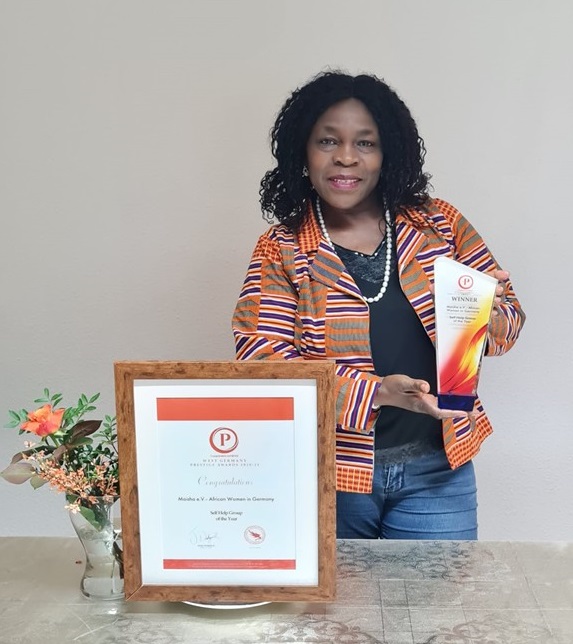
One of the organisation’s initiatives, Maisha Akwaaba Project (MAP), launched two years ago with the support of Germany’s Foreign Ministry, raises awareness of the dangers of irregular migration in Ghana. Akwaaba means welcome in the Akan language.
Greiner was inspired to start the project in Ghana by a request from the office of German President Frank-Walter Steinmeier, who was about to go on a state visit to Ghana in December 2017 to open the Ghanaian-German Centre for Jobs, Migration and Reintegration in Accra.
African women and girls often fall victim to human traffickers who deceive them with the promise of a rosy future in Europe only to trick them into situations where they are subjected to exploitation and violence. This is how many girls and women told of decent jobs waiting for them in Europe find themselves forced into prostitution when they arrive.
Even before reaching Europe through irregular routes, many of the female migrants are exposed to horrendous human rights violations including rape and other physical abuses.
Many of the female irregular migrants who must return home, being unable to secure legal residency, face difficulties back in their homelands, including the shame of failing to find a better future in Europe and having nothing to do to sustain themselves.
To address the situation, MAP not only raises awareness of the dangers of irregular migration through advocacy work of the returnees but also empowers them to be able to build a decent and sustainable livelihood in Ghana.
MAP trains returnees to become counsellors on migration who visit schools to talk about their experiences so that girls can gain a realistic picture of what irregular migration entails and therefore become less susceptible to the deceit of human traffickers.
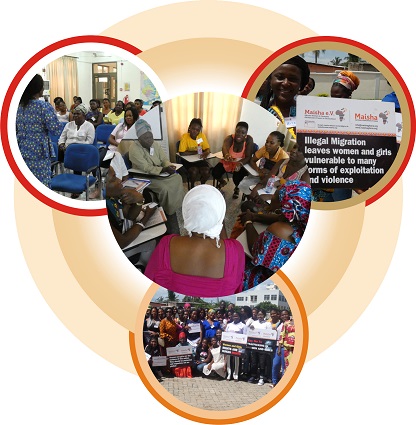
Maisha Akwaaba Project raises awareness of the dangers of irregular migration in Ghana and empowers returnee girls and women by providing space for them to learn skills ranging from soap-making, snail farming to fashion creation/Photo: Maisha e.V.
Moreover, the returnees provide information about legal opportunities for migration, thereby empowering their listeners to make informed decisions when contemplating migration.
Another major activity of Akwaaba is capacity-building through the empowerment of the returnee girls and women by providing space for them to learn skills ranging from soap-making, snail farming to fashion creation. Maisha also supports them to develop their entrepreneurial ideas and market their products and services.
Greiner said: “Our intention is to understand their situation, to listen to their heartbeats and to offer assistance in helping them to rebuild their lives, which has been marked, sometimes for life, by their negative experiences.”
Maisha is currently lobbying for the establishment of a permanent centre in Ghana for women returnees “who often need somewhere to collect their thoughts and perhaps heal before returning to their homes”. Maisha will soon open its permanent office in Accra.
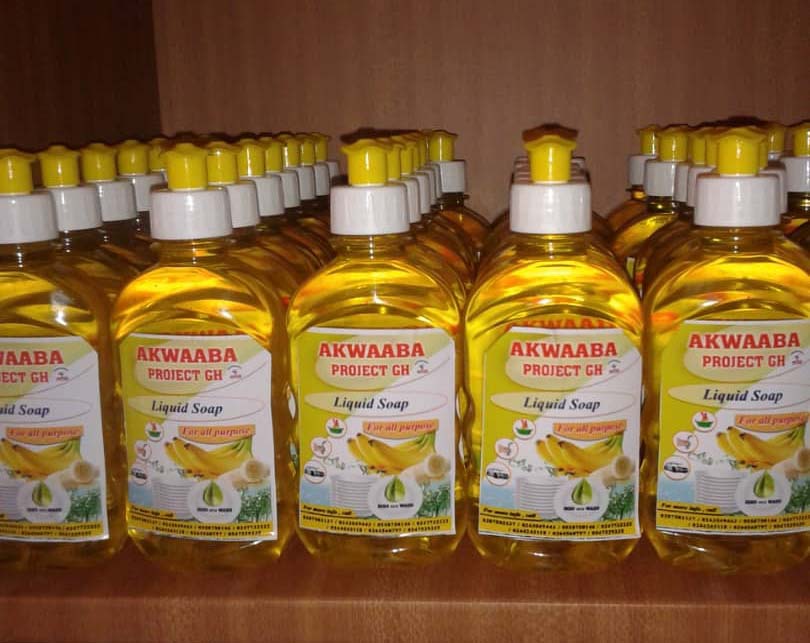
Liquid soap made by trainees of Maisha Akwaaba Project/Photo: Maisha e.V.
Greiner was one of the immigrants chosen by the German government to participate in the first Integration Conference called by Chancellor Angela Merkel in July 2006. She served on the committee set up by the conference to recommend measures to promote the integration of foreigners in the country.
Greiner was also one of the six Africans invited by German President Horst Koehler in August of the same year to parley with him on his Partnership with Africa initiative.
In June 2006, Dr Koehler awarded Greiner the Federal Medal for her efforts for the integration of African immigrants in the country. It was the first time a person of African origin received the German national honour.
Virginia Greiner believes Africans should see integration as “a process in which they are bringing something positive from their cultures to enrich Germany”. And she calls on African governments to take more interest in the way their citizens live abroad.
Larry Bello
More about Maisha e.V. at www.maisha.org
 THE AFRICAN COURIER. Reporting Africa and its Diaspora! The African Courier is an international magazine published in Germany to report on Africa and the Diaspora African experience. The first issue of the bimonthly magazine appeared on the newsstands on 15 February 1998. The African Courier is a communication forum for European-African political, economic and cultural exchanges, and a voice for Africa in Europe.
THE AFRICAN COURIER. Reporting Africa and its Diaspora! The African Courier is an international magazine published in Germany to report on Africa and the Diaspora African experience. The first issue of the bimonthly magazine appeared on the newsstands on 15 February 1998. The African Courier is a communication forum for European-African political, economic and cultural exchanges, and a voice for Africa in Europe.
























